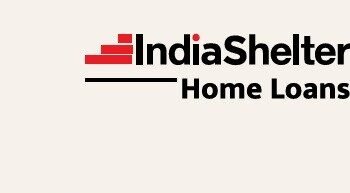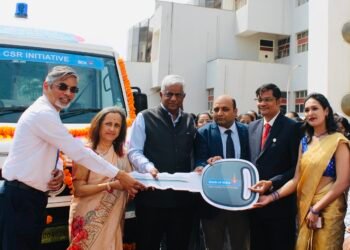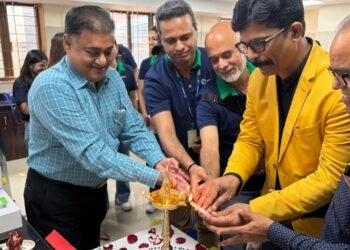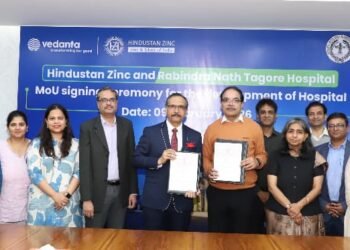International Year of Millets and the Social Intervention
Jamnagar, Gujarat India CSR: At the behest of the Government of India, the United Nations General Assembly in its 75th session in 2021, declared the year 2023 as the International Year of Millets. Being one of the oldest and largest Carbon Management Firms of India and hence of the Global South, Viviid Emissions Reductions Universal Private Limited in its ongoing Mother and Child Health and Nutrition Intervention at Jamnagar District of Gujarat in collaboration with its Implementation Agency – Association for Nutrition and Development Action (ANNADA) has included millets in the specially formulated, micronutrient – enriched supplementary food mix.
The beneficiaries include expecting and lactating mothers and children in the age group 0-6 years. This Intervention is being undertaken in close coordination with the Integrated Child Development Scheme (ICDS) of the Gujarat Government’s Women and Child Development Department and the District Administration.
Millets Combat Malnutrition and Climate Change
Talking about this intervention, Puneet Katyal, the Chief Executive Officer of Viviid Emissions Reductions Universal Private Limited said, “Considering that children are the present and future of our Nation, in all our Co-Benefit Interventions that we undertake in the vicinity of our Clients’ Renewable Energy /Process Efficiency / Nature Based Solutions there are clear and direct benefits for children. It should be noted that millet effectively fights Malnutrition.
Millets are small-seeded, round whole grain, widely grown around the world as cereal crops or grains for fodder and human consumption purpose. Millets are known to have an excellent nutritional profile and are a non-glutinous food, which makes them easy to digest and non-allergenic. Millets are rich sources of nutrients, especially phosphorus, potassium, calcium, and magnesium and also provide more essential amino acids than other cereals. Added to that are the Climate Action related benefits related to the cultivation of millets.
The carbon footprint of millets is comparatively lower than that of cereal crops. According to Scientists at World Resources Institute India, millets help mitigate the effects of climate change through their low carbon footprint of the 3,218-kilogram equivalent of carbon dioxide per hectare, as compared to cereals like wheat and rice, with 3,968kg and 3,401kg, respectively, on the same measure. Further, growing millets requires much less water and therefore they are easily cultivated in arid regions of Rajasthan.
This year the fortified food mixes that are being provided to the beneficiaries in Gujarat also contain coarse grains/ millets like Jowar and Ragi over and above cereals like soya, wheat and makai. We stand committed to the Government of India’s overarching initiative of combating hunger and malnutrition through concerted public action.”

Speaking about strengthening the Gujarat Intervention, Alvin Dsouza, Program Head at ANNADA said, “Millet grains are essential in addressing child malnutrition, as they are rich in essential nutrients such as iron, calcium, and B vitamins. Additionally, millets are easy to digest and are gluten-free, making them ideal for children with allergies or digestive issues. This is why we chose millet as a key component of our nutrition plan in the Mother and Child Health and Nutrition Intervention in Jamnagar, Gujarat.
Historically, millet has always been a part of our diet but they were somehow replaced over time. The Government of India has been promoting millet and we also believe that it is important to bring them back into the mainstream diet to address child malnutrition.”
View this brief video with testimonies from the beneficiaries of Mother and Child Health and Nutrition Intervention in Jamnagar District of Gujarat:
Giving Back to Society while Leading Climate Action
By the virtue of its decades-old expertise in Carbon Management, Viviid Emissions Reductions Universal Private Limited is already contributing towards the reduction of Green House Gas Emissions thereby promoting Climate Action.
Further giving a substantive push to Sustainable Development Agenda 2030, Viviid Emissions Reductions Universal Private Limited while conceptualizing the Co-Benefit/ Social Interventions plugs in programmatic themes around children’s education, self-defense for girls, sensitization of women and children about their rights and social welfare schemes, women and child empowerment, livelihood enhancement for the differently abled, setting up of women microenterprises, financial literacy for rural women, de-addiction initiatives among others. This is the Organization’s way of taking People and the Planet together. Intervention Designing is backed by hardcore facts and thorough Need Gap Analysis for a particular geography.

Intervention Touchpoints
This Intervention ‘Nourish to Flourish’ which is the flagship Program of ANNADA is currently underway in the Jamnagar District of Gujarat with support from Viviid Emissions Reductions Universal Private Limited. Under this Intervention, fortified nutrition is being regularly provided to over 275 beneficiaries i.e. expecting women, lactating mothers and children up to the age of 6 years. The fortified food mixes customized to the palate of local people are distributed to the beneficiaries through the Aanganwadi Centres. ANNADA is also enhancing the capacity of Aanganwadi Workers (AWW) and Aanganwadi Helpers (AWH) to guide the beneficiaries in appropriate intake of the nutritional food mix and its safe storage.
Sustained Awareness about Mother and Child’s Health and Nutrition
One of the integral aspects of the Intervention is to create awareness of health and its social determinants, mobilize the community towards local health planning, and provide access to the villagers for existing health services. Monthly health and nutrition awareness drives across the community with specific target groups are carried out. This is coupled with frequent home visits for encouraging the best health, hygiene and nutrition practices at home. Under the aegis of the Intervention ‘Nourish to Flourish,’ the implementation staff tracks the cases of mothers and children who are undernourished. These beneficiaries are thereafter referred to Nutrition Rehabilitation Centres, Public Health Centres and Rural Hospitals for further assistance. The Intervention staff regularly follows up with the ASHA workers and ANMs about the health status of the beneficiaries and whether or not they are taking the prescribed treatment.
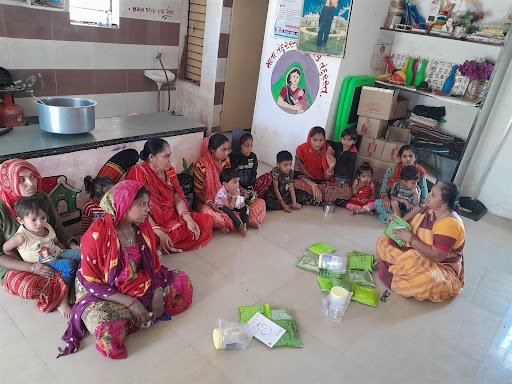
Special IEC material has been created in Gujarati for the beneficiaries and other key stakeholders to promote Good Health and Nutrition Practices. All activities under the Intervention are conducted as per COVID safety guidelines issued by the Government from time to time. There is a dedicated Community based Monitoring and Supervision Team that keeps a tab on crucial health indicators like Haemoglobin levels of expecting and lactating mothers through the Mother and Child Protection (MCP) card in coordination with frontline workers like the ANMs, ASHA and AWWs. It is ensured that pregnant women in the village are administered Tetanus Toxoid Immunization (TT1 and TT2) shots. Lactating mothers are regularly taken through Breastfeeding Sessions to ensure that it is done in a scientific manner. Awareness Sessions on Health and Nutrition and Safe and Adequate Water, Sanitation and Hygiene (WASH) are also held periodically.
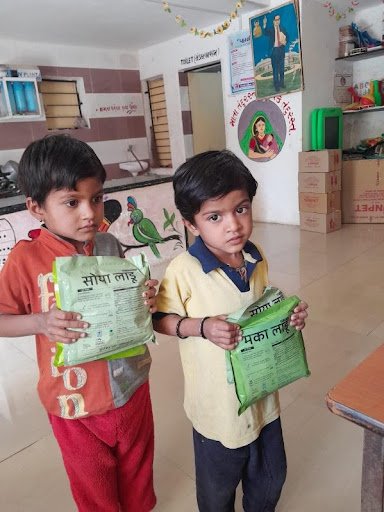
The growth of child beneficiaries is also monitored by Team ANNADA as and when required. Children with Severe Acute Malnutrition (SAM) and Moderate Acute Malnutrition (MAM) are closely monitored and referred to Nutrition Rehabilitation Centre and Primary Health Care Centres if required. The Intervention Staff of ANNADA is forever on its toes to support the beneficiaries.
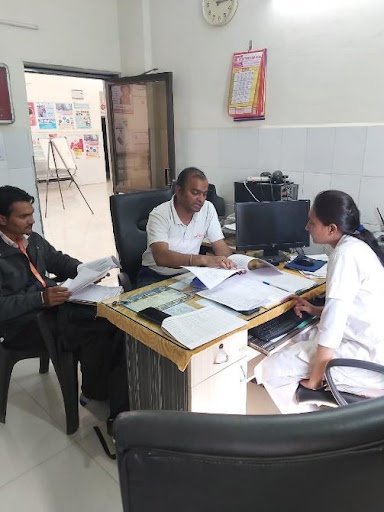
Including Millets in the Fortified micronutrients, Food Mixes is further going to enhance the growth and development of both Mothers and Children in the present geography of intervention. This sustainable practice will be replicated in other geographies in the years that follow.
(Copyright @ India CSR)




